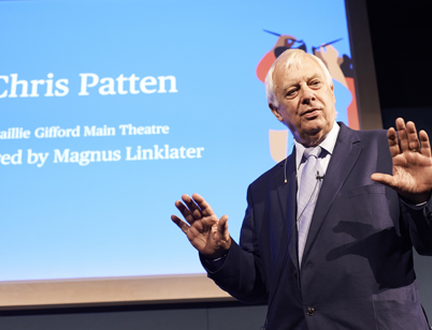More articles Friday 18 August 2017 8:00am
Chris Patten on Brexit, Hong Kong and Jacob Rees-Mogg

Former European Commissioner Chris Patten thinks “reality is waiting around the corner to mug us” when it comes to Brexit, which he described as “the most awful thing that’s happened in British politics in my lifetime”.
During an extensive discussion about his career in Westminster, Hong Kong and Brussels, Lord Patten told his Book Festival audience that he had no intention of getting “over it”. “There are some important things to go on fighting for and fighting about, and closing down identity politics for me is one of them.”
His memoir, First Confession, challenges the “identity politics” he believes has fuelled Brexit and Donald Trump’s rise in the United States. “People say to me, ‘where’s this Brexit going to end up?’,” Patten told event chair Magnus Linklater, “what does the Government plan to do in order to make the most of this opportunity to become ‘global Britain’? And the point I make is you can’t expect me to know how this is going to end, the Government doesn’t know how it’s going to end!”
Lord Patten said he believed there were “possibilities” of going “back to the British public either through an election, or conceivably through a referendum and then another election, and saying ‘do you really want this’? And this time no lies about £350m more for the National Health Service, no lies about 2 million Turks coming to Britain, none of that sort of Govery, Johnsonry or Faragery.”
The former Hong Kong governor also commented on the recent sentencing of Joshua Wong and two other leaders of the city’s democracy movement to several months in prison. “We should be proud of what those kids are doing,” said Patten, “and I think they will be remembered, and their names will be remembered, long after nobody can remember who I was, and perhaps nobody can remember who President Xi Jinping was.”
And he said China’s treatment of the Nobel Peace Prize-winner Liu Xiaobo, who died last month after being released from prison on medical parole, had been “appalling”. “The last person treated like that was a Nobel Peace Prize winner in the 1930s who was locked up by the Nazis,” said Lord Patten. “And the way his wife is being treated today is appalling, and who is making a fuss about it? You search in vain for anything other than a rather mealy-mouthed statement from foreign ministers, and it makes me wonder whether there’s a sort of decadence that’s affecting us which undermines any sense of honour we might have.”
Asked about Scotland, Lord Patten said that just as he thought it “bad for Britain’s economy to be outside our biggest market”, he also believed “it would be a mistake economically for Scotland to leave its biggest market in England and the rest of the United Kingdom”. And he said the UK would be “greatly diminished if Scotland wasn’t part of it”. “I come here to Edinburgh and think how wonderful it is that this is a British city, it’s part of the same state that I’m in. I think about the contribution Scotland has made culturally, economically, politically and in international affairs to the rest of us and I think I would feel diminished if Scotland…was to set off on another course of action.”
Recalling his early career in the Conservative Party, Patten revealed that his “first job” had been “looking after the Scottish MPs at Westminster”, when there were about 20 of them. “I have to say at that stage the Conservative Party in Scotland had a sort of musty, tweedy feel to it and I’m delighted, therefore, that whatever you say about Ruth [Davidson], you couldn’t say that about her.”
And asked for his views on the current Tory MP Jacob Rees-Mogg’s prospects of becoming leader of the UK party, Lord Patten had his doubts. “I’ve known Jacob since he was seven,” he said. “I think the sort of views that Jacob had then, which we regarded as being charming and eccentric, were fine when you’re seven, but I’m less keen on them now. He’s not a bad man, but not the most plausible candidate to be the next leader of the Conservative Party.”

 Major new partnership with Celtic Connections
Major new partnership with Celtic Connections 

